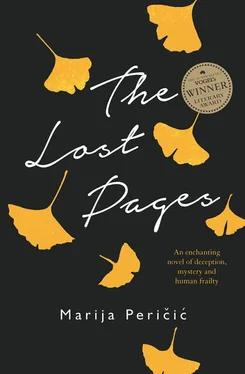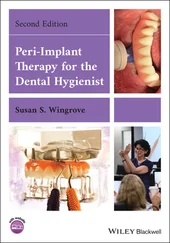Already I could feel the strength of that hunger growing, filling me with a fierce energy. I was strong and tall, made of burnished steel, hard, shining.
‘I need some time to consider,’ I said, but I had already decided, and I think he knew it.
[32] This section of the manuscript is written on unlined letter paper. The pages were folded and found in the centre of the booklet containing the previous section.
SOON AFTER THEODOR’S VISIT I WAS DISCHARGED. LEAVING THE asylum at last, my thoughts were fixed on Anja. I allowed myself the luxury of dreams. I pictured a life with her, the two of us in her house in the Martinsgasse or some other place—in the country, perhaps. I would work and write; there would be children; she would be a kind mother. I knew that these dreams were a dangerous game, sharp-edged, but, heedless, I gorged myself on them.
The same day that I was discharged I went to Anja’s house. I had made the journey so many times in my imagination that when it came to actually walking down the Martinsgasse it was like being in a dream. The curtains were still drawn over the windows, even though it was late morning, and for a moment I felt as if I had travelled back in time and was reliving one of my many fruitless visits of so long ago.
The place was full of memories. As I rang the bell I remembered the concierge, my old enemy, who had refused to open the door to me. Now I almost had a feeling of affection for him, but he did not appear, and instead the door was opened by a strange man who waved me through to the stairs indifferently.
Instead of feeling nervous, as I had expected to, I floated up the staircase, euphoric. But this soon faded. The house was darker than I remembered and an unnerving smell lingered in the air. I arrived at the door; the landing on this floor was even darker than the staircase, surely much darker than it used to be. I could hear muffled footsteps in the apartment. My eye was caught by a dark mass attached to the door and at first I could not decipher what it might be, its shape was so indistinct in the gloom. It looked like one of those large bulbous fungi that grow on the trunks of some forest trees. I reached out to touch it, feeling a wave of revulsion as my fingers approached it, expecting a sticky coolness, a spongy cobweb texture, but my fingers instead found the dark shape to be soft and dry; velvet. Specks of dust had stuck to my fingers when I pulled my hand away. I realised that it was the large velvet bow on a wreath, a funeral wreath. I felt a wave of angry jealousy, as for one mad second I thought that the house was in mourning for Franz, but then an even more terrible thing occurred to me: what if it was Anja? The ground wheeled away from me and I had to steady myself against the wall for a moment before I started hammering at the door. Almost immediately the door was opened and the housemaid stood before me, wearing a black armband.
The housemaid’s face was blank and she did not appear to recognise me. She turned immediately to usher me through to the living room, before flitting off.
‘Anja?’ My voice followed her down the corridor, but she seemed not to hear. I paced around the living room, frantic at the thought that I might have lost Anja. I strained my ears for the sound of her voice, and my heart raced until I thought I might choke with anxiety. I forced myself to sit down and slow my breaths. I looked around the room, trying to distract myself. The apartment was completely different to how I had remembered it. In my memory it had seemed so grand, but now it was close and crowded with furniture, dimly lit by a single lamp. This contraction of size was partly caused by the drawn curtains, and I now saw that the mirrors were also shrouded in dark fabric.
The sight of them instantly reminded me of my brother. He had died when I was very young, too young to remember his death at all, but those covered mirrors remain a strong image of my childhood. While Otto’s death had not troubled me, the thought of losing Anja almost struck me down. Flashes of my idle dreams of a life with her came to me like taunts, and I had to fight back my tears.
Then came the sound of footsteps approaching the door: a woman’s step, slightly clicking, fast and light. The door opened and I saw a pale hand, and I could not tell if it was hers, though I thought of all the times I had watched Anja’s hands fluttering and unfolding like white butterflies. Then came an arm, black-clad, and a shoulder, and then there was Anja, in the room.
Unthinking, I launched myself out of the chair towards her, my arms outspread, the tears unchecked, but tears now of relief. I folded her, little Anja, in my arms, and I thought I would die of pleasure from her warm, small body, the smell of her hair. I smiled while the tears still sprang forth. I held her tight and presently noticed a throbbing in her body: sobs. She pulled away then and covered her face with her hands.
I remembered myself, and that she had suffered a death—her mother’s, perhaps.
‘Little Anja,’ I said. ‘I’m so sorry.’
She could not speak at first, and only nodded.
‘Every time I come into this room,’ she said in a choked voice, ‘I expect him still to be here, sitting in his chair.’ She looked over at the plush armchair by the fire, where Herr Železný had sat at our first meeting. And it was true that an air of expectancy hung about the chair, like the throne of a king awaiting the heir. And that heir—I could not stop the thought—could be me. My mind filled again with dream pictures of a life with her. I was a different man now to the one she had known; stronger, and worthy at last of her affection. It was hard to keep from laughing with joy at the thought that she could still be mine, and keep my countenance suitable for a house of mourning.
The door opened again and a man entered the room. He looked at me with a wary face.
‘Tomáš,’ Anja said, ‘this is my great friend Herr Brod, of whom you have heard so many stories.’
The man nodded, glaring at me.
‘Max, this is Herr Liška.’
My face turned to stone. So this was the man. Liška. Tall, muscular, with a clever face, he was worse than my most paranoid imaginings. I strained to keep my expression under control, to look welcoming and pleasant.
He came towards me with his hand outstretched. We shook hands and I could see him sizing me up, taking my measure, while I tried to place him. Was he here to make a bid for Anja, like me? Or had he already done so? And if that were the case, had he won or lost? We seemed to circle each other like two dogs.
‘Brod,’ he said. ‘I’ve heard a lot about you.’
I did not say, And I of you , but only, ‘Yes.’
He began pacing the room, his eyes on me the whole time. I tried to glean his position from Anja’s attitude. She seemed to make no overtures towards him, but neither did she seem to spurn him.
‘But it is a great shame to meet at such a sad occasion,’ he said. He stopped in front of Herr Železný’s chair. ‘Poor Anja has been out of her mind with grief. It’s good for her to have her friends around her at such a time.’
Friends? Did he mean he himself?
Then Liška held out his arm, beckoning, and Anja crossed the room to his side. He enfolded her casually in one arm and lightly kissed the top of her hair, his eyes on me. Then he sat down in Herr Železný’s chair, leaned back magisterially and regarded me.
Anja went over to the window and pulled back the curtain a small way to look out. Liška and I locked eyes, and I remembered doing the same with Herr Železný on my first visit here, but this time I did not let my eyes fall. How I hated Liška at that moment. After a few seconds Liška rose, saying, ‘I’m sure you two have much to talk over. Anja, I must go out, but I’ll be back in an hour.’
Читать дальше












